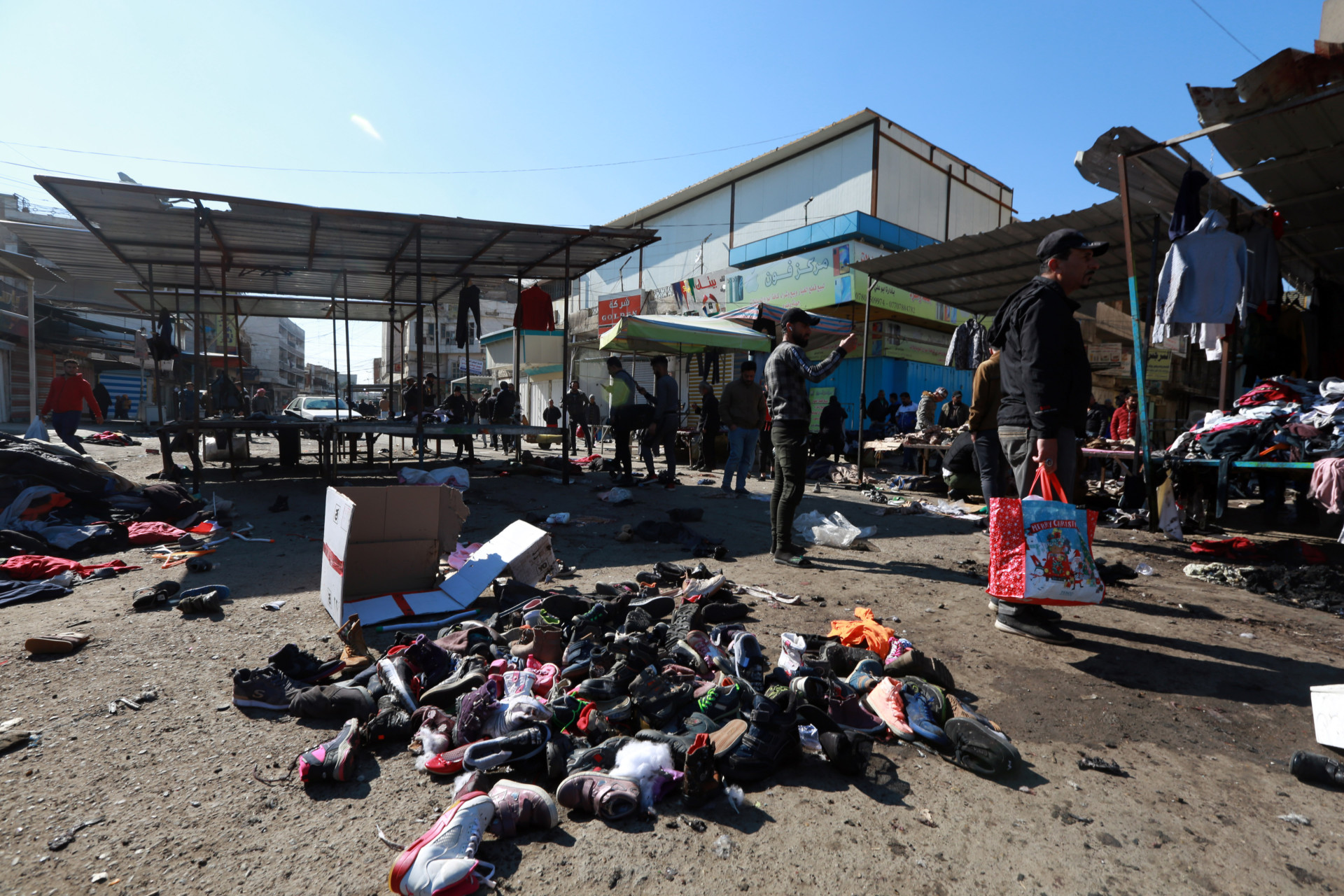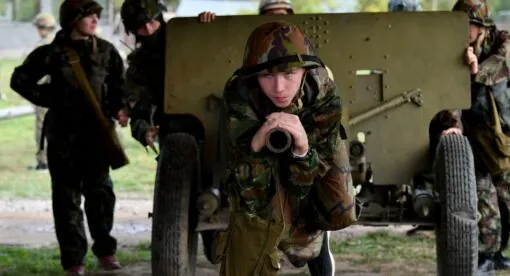The latest suicide attacks in Iraq show that ISIS can still make use of human lapses and holes in the capital’s tightened security.
The recent suicide bombings in Baghdad have created a ripple effect that demands more attention. Iranian-backed militias have formally accused the Gulf states of supporting ISIS and waged their own drone war from Iraqi soil against Saudi Arabia. Further escalation can exacerbate instability in the region without an effective U.S. policy for dealing with aggressive nonstate armed groups.
On Jan. 21, two suicide bombers detonated their explosive vests in Baghdad’s Tayaran Square, killing 32 Iraqi civilians and injuring more than 100. The method of the bombings suggests ISIS involvement for the first time in three years. After less than 12 hours, ISIS claimed responsibility in a statement hailing the attacks as a victory against Shiite Iraqis.
These latest suicide attacks show that the group can still make use of human lapses and exploit holes in Baghdad’s tightened security measures. They also point to the difficulty in sending car bombs and planting IEDs in major cities – core tactics for ISIS in its underground insurgency phase. Checkpoints in all the major areas, intense background surveillance on all points of entry into Baghdad from other provinces, intelligence and informant tips on bomb manufacturing in the outskirts, and periodic raids to disrupt sleeper cells have contributed to the noticeable decrease in attacks in the capital.
It is too soon to suggest the most recent bombing is an isolated attack, but it does not necessarily prove an increase in ISIS capability to operate freely in populated areas nor that the group has ended its three-year hiatus in Baghdad. However, the timing of the attack and the events it set in motion are crucial given the new but relatively familiar U.S. administration and rising regional tensions as Iran seeks to strengthen its position before possibly re-entering the nuclear deal.
The Specter of Saudi Involvement and Militia Retaliation
These rare attacks in the context of a long absence of ISIS activity in the Iraqi capital has many among the public (based on media interviews and reactions) believing that the suicide bombings were directly carried out or at least facilitated by the ruling political parties and their armed wings, given that campaigning has begun for the general elections due in October. There is no evidence that the attack was an inside job. However, the accusations reflect the continued discontent and distrust Iraqis have toward the entire political system.
In the aftermath of the attack, the discourse shifted into various claims over the identities of the suicide bombers. Before ISIS claimed responsibility, social media accounts affiliated with the self-proclaimed resistance in Iraq – a group of Shiite militias that include some members of the Popular Mobilization Forces (PMF) and other non-state actors – claimed the suicide bombers were Saudi nationals. Sana’a al-Musawi, a member of Parliament from the Fatah Alliance – the political arm of the PMF – also alleged that the perpetrators were Saudi. A spokesperson for the parliament’s security and defense committee shot down the allegations – saying that the attackers were Iraqi nationals.
Linking ISIS to Saudi Arabia is neither new nor restricted to ideological militias. A mainstream conviction in Iraq is that the kingdom shares some responsibility for the extremist ideology behind all Sunni terrorist groups. However, newly formed resistance militias in Iraq accused Saudi Arabia of sending the bombers and coordinating the attack in Tayaran Square. They also claimed to have executed a swift act of retaliation against the kingdom less than 48 hours later. These new militias are not part of the state-sponsored PMF units but are suspected to be splinter groups created for the purpose of outsourcing some activity that state-sponsored militias can no longer carry out with impunity.
On Jan. 23, Saudi air defenses thwarted what appeared to be a missile or drone aimed toward the capital, Riyadh. Usually such attacks are seen as the world of the al-Houthi armed rebel group in north Yemen, which has significantly enhanced its offensive operations thanks to cooperation with and backing from Iran’s Islamic Revolutionary Guard Corps (IRGC). The al-Houthi rebels have used long-range missiles and drones to attack Saudi Arabia’s facilities over the past five years of the grinding war in Yemen. However, the rebel group – which often boasts about its ability to move the war inside Saudi borders – denied involvement in the Jan. 23 attack. Soon after, an unknown Iraq-based group calling itself Alwiyat al Wa’ad al Haq (The True Promise Brigades) issued a statement claiming responsibility for the drone attack on Saudi Arabia and threatening a second attack on Dubai. The “Brigades” appear to be one of several new militia groups, judging from the praise and support the statement received on official resistance social media channels.
According to the statement, the drone attacks were in retaliation for the Gulf Arab states’ alleged support to ISIS. The group added that a drone would be sent to Riyadh “for every suicide attack” in Iraq. The United States denounced the attack in a public statement without naming the perpetrators. Meanwhile, Saudi Arabia did not comment on the Iraqi militia’s claims though it did condemn the twin bombings. Abu Ali Al Askari, a security official with Kataib Hezbollah, praised the attack and congratulated the group. Two days later, Saudi forces intercepted what they described as a “hostile air target” aimed toward Riyadh. The al-Houthi fighters once again denied involvement, and the True Promise Brigades claimed responsibility.
While both attacks did happen, neither the militia’s claims nor the al-Houthi fighters’ denials could be verified. Saudi authorities have not released information confirming the trajectories of the objects the Saudis intercepted in the attempted attacks. But an attack on Saudi Arabia from Iraq would represent a complicated challenge for the governments in Baghdad, Riyadh, and Washington.
Iran’s Role in Iraq-Based Militias
An ISIS attack on Iraqi soil is seldom an isolated event without accompanying chaos and further implications. The group exploits the public confusion and media attention created by an attack while assessing the possible reactions of the security apparatuses and coalition forces to strategize for the next phase. ISIS is usually not the only group reaping benefits.
Iranian influence on Iraq’s security apparatuses arguably began with the U.S. invasion. Badr Corps – the Iranian-officered military wing of the Iran-based Shiite Islamist party, Islamic Supreme Council of Iraq – and its leader Hadi al-Ameri played a significant part early on in putting Iraq’s Interior Ministry almost entirely under Iran’s sway. The influence was subtle, largely due to the presence of the U.S. military. Following the withdrawal of American forces from Iraq, the country plummeted into violence caused by the groups that were predecessors of ISIS. Iran’s security strategy was considered a failure that allowed Iraqi villages and cities to fall simultaneously to ISIS in late 2013.
Ironically, it would be ISIS that presented Iran with an opportunity for redemption. With Gen. Qassem Soleimani at the helm of IRGC’s Qods Force, Iran exploited Iraq’s defeated military forces and public panic to enhance and expand its regional influence. In Iraq and under the pretext of fighting ISIS, the IRGC-QF infiltrated nearly all of Iraq’s fighting forces. The creation of the PMF was a crucial step in cementing Iran’s military domination of Iraq. This left the United States and its coalition to begrudgingly tolerate Tehran’s presence and at times offer direct support when the threat of ISIS peaked.
Often associated with Grand Ayatollah Ali al-Sistani’s ambiguous fatwa, the PMF started out with local volunteers to fight ISIS, then gradually imposed itself as an official part of Iraq’s security sector. The most powerful militias in the PMF, like Kataib Hezbollah, are committed to protecting Iran’s interests in Iraq and were operating in a somewhat permissive environment until 2019, when the United States began designating PMF leaders as terrorists and targeting some of their weapon arsenals and convoys. One way to avoid accountability was to create new groups unaffiliated with the PMF. Militias such as Usbat al-Thaireen (League of Revolutionaries) and Raba’ Allah (Fellows of Allah) carried out attacks against U.S. military convoys and the U.S. Embassy, raided public venues deemed too “westernized,” kidnapped and assassinated activists, and threatened personal freedoms. These groups have largely contained their activity within Iraq’s borders, but the recent attacks on Riyadh are a huge escalation that once again exploits ISIS activity inside Iraq to serve Iran’s regional ambitions at the expense of Iraq’s stability.
If Iraq-based militias are responsible for the attacks, as per their own admission, this would be an embarrassment for Iraqi Prime Minister Mustafa al-Kadhimi amid increasingly warming ties between Iraq and Saudi Arabia. Moreover, the escalation adds another security concern in the region that the Biden administration will have to factor in as it moves to re-enter the Joint Comprehensive Plan of Action, also known as the Iran nuclear deal.
The Biden Administration
Though Iraq is once again the center of ISIS and militia activity, regional conflict, and growing popular discontent with the government, the Biden administration does not appear to have a significant strategy for the country – a grave mistake shared by the Trump and Obama administrations. Viewing Iraq strictly in terms of Washington’s relationship with Iran has created a situation in which non-state armed groups are strengthened while Iraq’s sovereignty is weakened.
ISIS and Shiite resistance groups have created a “seesaw” effect in Iraq in the sense that weakening one group strengthens the other, and always at an immense cost for the Iraqi people. Confronting a potential ISIS comeback should always be a priority for the United States and the coalition without hesitation – and without consequently enhancing other rogue groups. There is room for the Biden administration to navigate these complexities by assessing where both previous administrations went wrong and formulating a policy that does not require military escalation.
In 2014, the United States intervened too little, too late to the ISIS surge that claimed large swaths of Iraq. Coalition airpower was essential in wiping out ISIS capabilities, but the lacerated Iraqi military, with the exception of the U.S. trained Counter Terrorism Service, gave room for non-conventional IRGC-backed groups to claim an outsized role on the ground. The context today is different. Iraq’s military is more capable and less prone to collapse than it was six years ago.
Increased U.S. cooperation with a formal security apparatus could marginalize and restrict the militias’ role. It could also decrease their legitimacy and credibility without resorting to military confrontation or escalation that could threaten Iraq’s stability. The new administration is facing perhaps a more entrenched Iranian influence in Iraq than its predecessors faced. But that presence is also less organized, less popular, and more aggressive in the aftermath of the loss of Soleimani.
Washington should use these circumstances when renegotiating the nuclear deal with Iran. The influence of IRGC-backed militias in Iraq has been wrongly portrayed as organic and popular when it is in fact the outcome of a weak political system and coercion through intimidation. Iran has used this outcome to its benefit in diplomacy when negotiating the nuclear deal, so countering it by the same diplomatic means should not be ruled out.
Saudi Arabia has not yet commented on the Iraq-based militia’s claims of responsibility for the recent attacks on Riyadh. One plausible reason is the kingdom prefers, for the time being, to stick the accusation to the al-Houthi fighters as Washington reviews its terrorist classification of the pro-Iranian Yemeni movement and its excessive weapon sales to the Gulf states. Another reason could be Riyadh’s relatively good ties with the current Iraqi government – another contrast to Iraq’s position in 2014 and a good incentive to build on. Nonetheless, Riyadh will not tolerate further aggression from Iraq-based militia groups, which would complicate any future security compact in the region.
The compartmentalization of security threats and challenges in the region has left Iraq a victim to different forms of chaos and terrorism that have, in all scenarios, caused immense backlash. The United States should focus on a policy that does not by default strengthen any hostile power in Iraq, and that can only be achieved by formulating a clear policy toward Baghdad that views it as part of a regional solution rather than a byproduct of an unpopular, disavowed war.
Rasha Al Aqeedi is a Senior Analyst and the Head of the Nonstate Actors program in the Human Security Unit at the Newlines Institute. Prior to joining the Newlines Institute, Al Aqeedi was the editor in charge of “Irfaa Sawtak,” a U.S.-based platform that offers insights into post-conflict communities in Iraq and Syria.. She has also served as a Fellow with the Foreign Policy Research Institute and George Washington University’s Program on Extremism and tweets at @RashaAlAqeedi.
The views expressed in this article are those of the author and not an official policy or position of the Newlines Institute.







